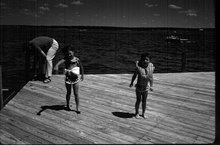
sunday february 16th,
almost springEvery story is, according to Michel de Certeau, a travel story, a spatial practice. Narrative structures, such as our li[ves] are spatial structures. Their network contains the vertiginous epoch of space: ‘we are in the epoch of juxtaposition, the epoch of near and far, of the side-by-side, of the dispersed.’ --Exhibit Program, Bewitched, Bothered and Bewildered: Spatial Emotion in Contemporary Art and Architecture
After posting D.’s
The Rapture the other day (and viewing her other images of that scene, some which even more eerily evoked a sense of just such a thing having happened) I felt strangely disconcerted all day. Perhaps it was intense prayer that shed some light--not prayer in the mantric way we are taught as children, but the mumbled urgent outpouring into the unknown, toward the unknown, perhaps impossibly bent ear, perhaps toward a gaping void. But that relief should visit us after such an outpouring--is that evidence enough of Existence? I don’t know.
I have often considered whether some unsuspecting web surfers might happen upon the title of this blog and immediately dismiss it as some conservative Christian diabtribe on hellfire and brimstone--
redemption is such a powerful word, and carries such heavy baggage. For me it has always carried more literal luggage, that of the Latin
redimere, to buy back, to ransom, to rescue, release, or set free. However, from the perspective of de Certeau, the word is always in movement, always a passage, as in Newton’s powerful explication of
place-flight-border-beyond, “Text mimes travel; terrain awaits its inscription in cartography.”
The Rapture (photo) made connections that were all the while being inscribed, but nevertheless had not registered consciously. That
Redemption Shoes was a project about seeking the grandfather through light (and I avoid some obvious interpretations here) had always seemed a fully secular undertaking. But now I am being tugged by these deeper questions, and these brought more fulsomely to the fore through literature, especially Annie Dillard (lately) and Marilynne Robinson.
Margaret Lowen Reimer (1982) wrote in “The Dialectical Vision of Annie Dillard’s Pilgrim at Tinker Creek,” When Pilgrim at Tinker Creek appeared in 1974, reviewers agreed that it was a highly unusual treatise on nature. The work obviously exerted a peculiar power, for reviewers were either rhapsodic in their praise or passionate in their indigination. Neither side, however, was quite sure in what tradition or genre the book belonged…Why? Perhaps the book falls between several categories of disciplines--the scientists relegate the work to the religious; the religious view the book as an aberration of scientific investigation. Indeed, the subtitle, “A mystical excursion into the natural world,” hints at the paradox and incongruity which characterizes the book. [PaTC] appears to be a scientific study overlaid with spiritual contemplation, an examination of natural phenomena, which leads the author to an encounter with the Divine. This fervent observer is an unusual empiricist and a still more unusual mystic (182).
Which is to say what exactly?
Salt and light. Looking at the last few blog headings of lines derived from Dillard, it occurs to me that looking for him (my grandfather) through light may well have been the central fugitive narrative for him as well, struggling with a life unbalanced on the tipping fulcrum between the sacred and the profane, seeking to strike a harmony between these essentially contradictory forces of mass and light on the graphic plane of the photographic image. The image as redemption.
The resolution of the urgently mumbled prayer was not, however, this realization, but the realization that my equally fervent, mumbled attempts to seek and carve out sacred, undefiled or quasi-undefiled nature in my own life were essential to me--that mystical excursions in to the natural world are required in this seeminlgy unnatural one, top heavy with the profane.
Then one day I was walking along Tinker Creek thinking of nothing at all and I saw the tree with lights in it. I saw the backyard cedar where the mourning doves roost charged and transfigured, each cell buzzing with flame…The vision comes and goes, mostly goes, but I live for it, for the moment when the mountains open and a new light roars in spate through the crack, and the mountains slam. (35)

















































